Receiving Gifts: The Complete Love Language Guide to Thoughtful Giving (2025)

Receiving Gifts: The Complete Love Language Guide
“She’s so materialistic—she always wants gifts for everything.”
Tom rolls his eyes as his wife Emma mentions hoping for a small present for their anniversary. To him, the expensive dinner he’s planning should be enough. What he doesn’t understand is that Emma’s desire for gifts has nothing to do with materialism or greed. For her, whose primary love language is Receiving Gifts, a thoughtful present—even something as simple as a handwritten note or a flower from the garden—communicates “I was thinking of you” in a way that experiences alone cannot.
This scenario illustrates one of the most profound misunderstandings about Receiving Gifts as a love language. It’s not about the monetary value, the size of the gift, or accumulating possessions. It’s about the thought, care, and intentionality that a meaningful gift represents.
If you’ve ever felt hurt when someone dismissed your appreciation for gifts as shallow, or if you struggle to understand why someone would value a small token over a grand gesture, this comprehensive guide will help you navigate the meaningful but often mischaracterized world of expressing love through thoughtful giving.
Understanding Receiving Gifts: Symbols of Love, Not Materialism
Receiving Gifts as a love language centers on the symbolic meaning behind thoughtful presents rather than their material value. For people with this love language, gifts serve as tangible reminders that someone was thinking of them, understands them, and values their relationship enough to invest time and thought in selecting something meaningful.
Research in relationship psychology shows that gift-giving activates neural pathways associated with social bonding and emotional connection. For people whose love language is Receiving Gifts, these neurological responses create lasting emotional impact because the physical object serves as a continuing reminder of the giver’s care and thoughtfulness.
Core Elements of Receiving Gifts:
Thoughtfulness Over Value:
- The emotional impact comes from knowing someone thought of you specifically
- Personal relevance matters more than expense or impressiveness
- Gifts that show understanding of your interests, needs, or personality
- Evidence that someone invested mental energy in choosing something for you
Symbolic Meaning:
- Gifts represent the relationship and the giver’s feelings
- Physical objects serve as tangible reminders of love and care
- Presents mark important moments and create lasting memories
- Gifts communicate messages that words might not fully express
Intentional Selection:
- Choosing gifts that reflect knowledge of the recipient’s preferences
- Finding presents that address specific needs or desires
- Selecting items that connect to shared memories or inside jokes
- Putting effort into the selection process, not just the purchase
Timing and Presentation:
- Giving gifts at meaningful moments, not just obligatory occasions
- Thoughtful presentation that shows care in the giving process
- Surprising someone with unexpected tokens of affection
- Marking special occasions with appropriate gifts that honor the moment
The Psychology Behind Why Gifts Matter
For people whose primary love language is Receiving Gifts, thoughtful presents create unique psychological benefits that other expressions of love cannot fully replicate.
Tangible Evidence of Love:
Unlike words that fade or actions that are completed, gifts provide ongoing, physical evidence that someone cares. People with this love language often keep meaningful gifts for years because they serve as tangible reminders of important relationships and moments.
Security Through Symbolism:
Gifts create emotional security by providing physical proof of the relationship’s importance. During difficult times or periods of separation, meaningful gifts can provide comfort and reassurance that might not be available through other love languages.
Memory Creation and Preservation:
Research shows that gifts create stronger memory formation around positive relationship experiences. For people with this love language, gifts help preserve and recall important moments and feelings.
Recognition and Understanding:
When someone gives a gift that perfectly matches the recipient’s interests or needs, it communicates deep understanding and attention. This recognition of who they are and what matters to them creates powerful emotional connection.
Common Misconceptions About Receiving Gifts
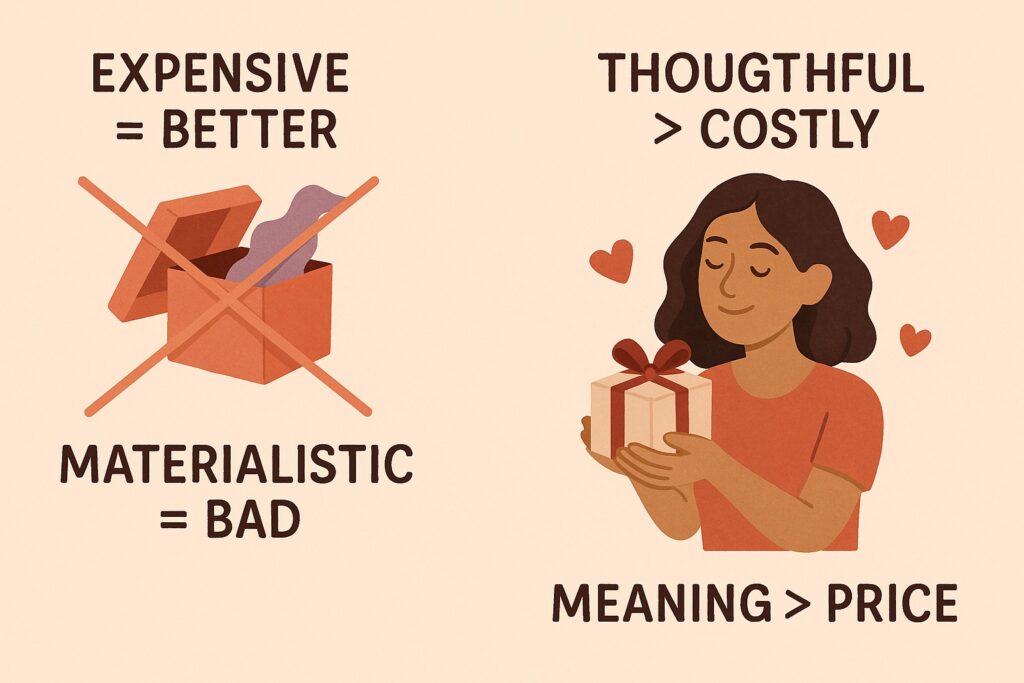
Receiving Gifts is perhaps the most misunderstood love language, leading to judgment, missed opportunities for connection, and hurt feelings on both sides.
Misconception 1: “People who need gifts are materialistic or greedy”
Reality: Receiving Gifts as a love language is about the thought and meaning behind presents, not accumulating possessions or expensive items. Many people with this love language treasure inexpensive, handmade, or symbolic gifts more than costly purchases.
Impact of misconception: Their legitimate emotional needs are dismissed as character flaws, and opportunities for meaningful connection through thoughtful giving are lost.
Misconception 2: “Good gifts have to be expensive”
Reality: The most meaningful gifts for people with this love language often cost little or nothing—a handwritten note, a flower from the garden, a book that reminded you of them, or something handmade with care and thought.
Impact of misconception: People avoid giving gifts because they think they can’t afford “good enough” presents, or they focus on expensive items that lack personal meaning.
Misconception 3: “Gifts are only for special occasions”
Reality: While people with this love language appreciate gifts on birthdays and holidays, spontaneous “just because” gifts often create even stronger emotional impact because they demonstrate unprompted thoughtfulness.
Impact of misconception: Gift-giving becomes limited to obligatory occasions, missing opportunities for ongoing connection and spontaneous expressions of care.
Misconception 4: “If I have to ask what they want, it doesn’t count”
Reality: While surprise gifts can be wonderful, asking for guidance about preferences shows care about giving something truly meaningful. Many people with this love language would rather receive something they’ll treasure than be surprised with something that misses the mark.
Impact of misconception: Givers avoid asking for guidance and may choose inappropriate gifts, while receivers feel frustrated by presents that don’t reflect understanding of their preferences.
Recognizing Receiving Gifts as a Love Language
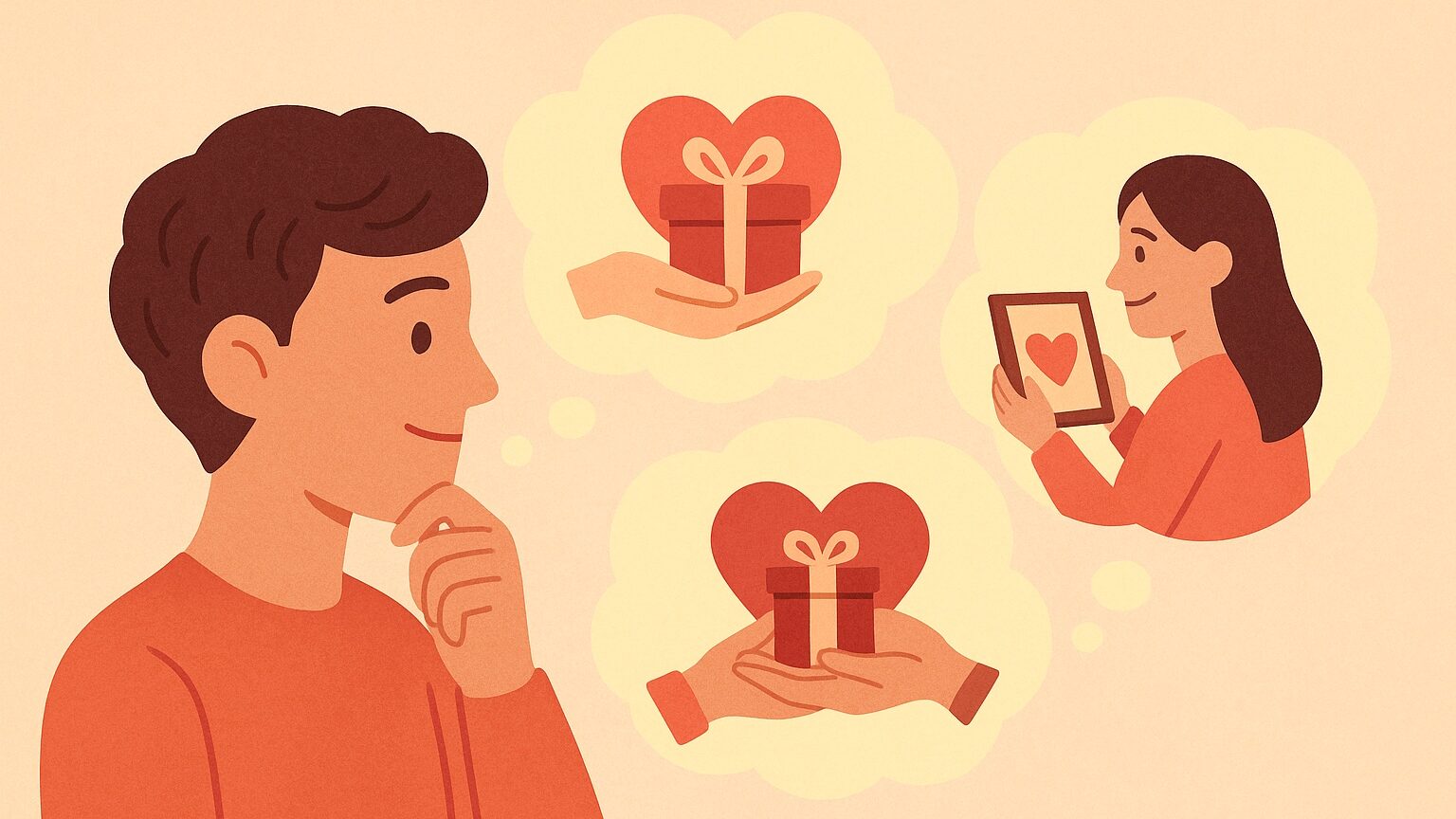
Learning to identify when someone values Receiving Gifts helps you connect with them more effectively while understanding their natural way of expressing care.
Signs Someone’s Love Language is Receiving Gifts:
They Give Thoughtful Gifts to Others:
- They naturally think to bring presents for various occasions and non-occasions
- They put significant thought and effort into selecting gifts for others
- They often give “just because” gifts that show they were thinking of someone
- They remember what others mention wanting and surprise them with those items
They Treasure Meaningful Gifts:
- They keep gifts from important people for years, even small or inexpensive ones
- They remember who gave them specific presents and the occasions associated with gifts
- They display meaningful gifts prominently or store them carefully
- They reference past gifts and their significance in conversations
They Notice and Appreciate Thoughtful Presents:
- They seem especially moved by gifts that show personal understanding or thought
- They express detailed appreciation for gifts, mentioning specific aspects they love
- They appear disappointed when occasions pass without gifts, even if other gestures are made
- They light up when receiving unexpected presents, regardless of size or cost
They Express Love Through Gift-Giving:
- They frequently surprise others with small tokens of affection
- They bring gifts when visiting friends or attending events
- They put significant effort into finding the “perfect” gift for important people
- They use gifts to communicate feelings that might be difficult to express in words
What Receiving Gifts Looks Like in Practice:
Everyday Tokens:
- Bringing home a favorite treat or coffee for someone special
- Finding small items that reminded you of someone while shopping
- Giving books, articles, or items related to someone’s interests
- Surprising someone with something they mentioned needing or wanting
Thoughtful Selection:
- Choosing gifts that reflect deep knowledge of someone’s personality and preferences
- Finding presents that connect to shared memories or experiences
- Selecting items that support someone’s goals, hobbies, or current challenges
- Giving gifts that show you pay attention to their daily life and needs
Creative and Personal Gifts:
- Making something by hand that shows time and personal investment
- Creating photo albums, scrapbooks, or memory collections
- Writing letters or creating personalized items that can’t be purchased
- Finding unique or one-of-a-kind items that reflect the recipient’s individuality
Effective Gift-Giving: What Works and What Doesn’t
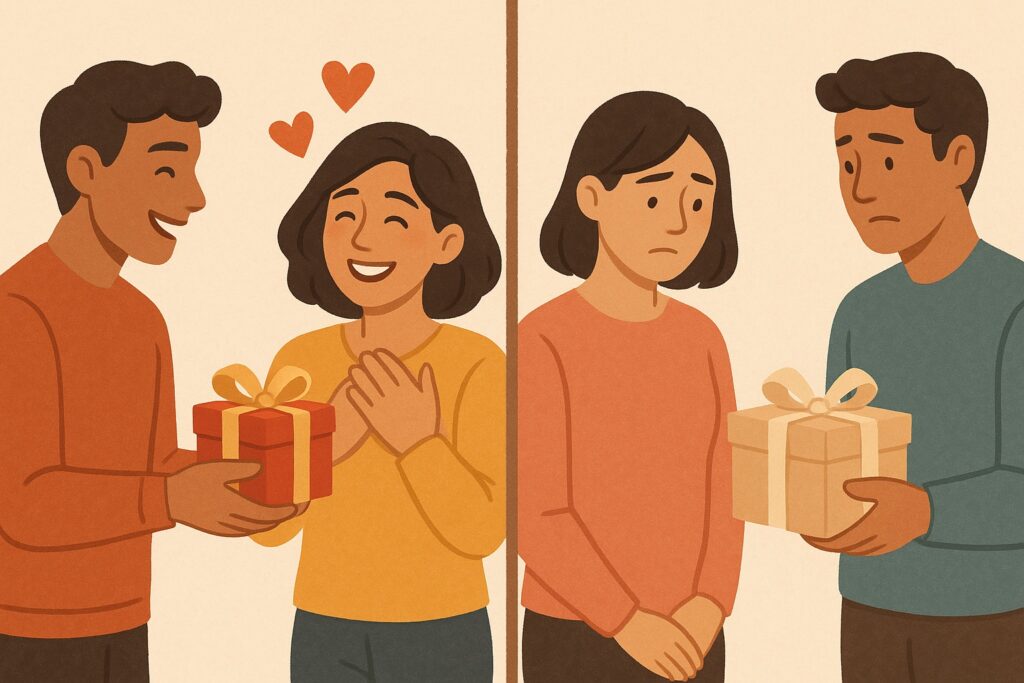
Not all gifts carry the same emotional weight for people whose love language is Receiving Gifts. Understanding the difference between meaningful and superficial gifts is crucial.
What Works: Thoughtful, Personal Gifts
Personal Relevance: Instead of: Generic gifts that could be for anyone Try: Presents that connect to their specific interests, needs, or personality—like a book by their favorite author or a tool for their hobby
Thoughtful Timing: Instead of: Only giving gifts on obligatory occasions Try: Surprise gifts “just because” or items given when someone needs encouragement or support
Meaningful Connection: Instead of: Expensive gifts without personal significance Try: Inexpensive presents that show you understand them—like their favorite candy bar after a difficult day
Evidence of Attention: Instead of: Gifts that show you weren’t paying attention to their preferences Try: Presents that demonstrate you listen to what they say they like, need, or want
What Doesn’t Work: Thoughtless or Obligatory Gifts
Avoid Generic Presents:
- Gift cards without personal thought or connection to their interests
- Standard “safe” gifts that show no knowledge of their personality
- Expensive items chosen without consideration of their preferences
- Presents that reflect your interests rather than theirs
Avoid Last-Minute Panic Purchases:
- Gifts obviously chosen in haste without thought or care
- Presents that feel like obligations rather than expressions of love
- Items purchased because you “had to get something” for an occasion
- Gifts that show no investment of time or mental energy in selection
Avoid Self-Serving Gifts:
- Presents that primarily benefit you or serve your preferences
- Gifts that come with expectations or strings attached
- Items chosen because they were convenient or on sale rather than meaningful
- Presents that feel more like bribes or attempts to influence behavior
Avoid Dismissive Attitudes:
- Treating gift preferences as less important than other love languages
- Making someone feel guilty or materialistic for appreciating gifts
- Refusing to put thought into gift selection because “it shouldn’t matter”
- Using practical necessity as an excuse to avoid thoughtful gift-giving
Receiving Gifts in Different Relationships

Receiving Gifts appears appropriately in various relationship contexts, with the key being thoughtfulness and appropriateness to the relationship level.
In Romantic Relationships:
Daily Tokens of Affection:
- Small surprise gifts that show you were thinking of your partner during the day
- Items that make their daily routine more pleasant or easier
- Treats or gifts that address current needs or stresses
- Spontaneous presents that celebrate ordinary moments
Special Occasion Gifts:
- Thoughtful presents for birthdays, anniversaries, and holidays that reflect deep knowledge of their preferences
- Gifts that mark relationship milestones or important life events
- Presents that create experiences or memories you can share together
- Items that support their personal goals, dreams, or current interests
Romantic Gestures:
- Surprise gifts that show ongoing attention to their likes and needs
- Presents that reference inside jokes, shared memories, or special moments
- Handmade items that represent time and personal investment
- Gifts that communicate feelings that might be difficult to express verbally
In Parent-Child Relationships:
For Children:
- Age-appropriate gifts that support their development, interests, or current fascinations
- Surprise presents that celebrate achievements or provide encouragement during challenges
- Items that create opportunities for shared activities or learning
- Gifts that help them pursue their individual personalities and interests
For Adult Children:
- Thoughtful presents that support their adult lives and current circumstances
- Gifts that honor their independence while showing ongoing care and attention
- Items that connect to childhood memories while respecting their adult preferences
- Presents that acknowledge their growth and current life stage
From Adult Children to Parents:
- Gifts that show appreciation for their influence and ongoing support
- Presents that acknowledge their interests and current life circumstances
- Items that create opportunities for shared experiences or conversations
- Thoughtful gifts that show understanding of who they are beyond their parental role
In Friendships:
Casual Friendship Gifts:
- Small tokens that show you’re thinking of friends during their challenges or celebrations
- Items related to shared interests or activities you enjoy together
- “Just because” gifts that strengthen friendship bonds without creating obligation
- Presents that acknowledge their support or kindness in your life
Close Friendship Gifts:
- More personal gifts that reflect deep knowledge of their personality and preferences
- Items that support their goals or help with current life challenges
- Presents that commemorate shared experiences or inside jokes
- Thoughtful gifts during difficult times that provide comfort or encouragement
In Professional Settings:
Appropriate Professional Gifts:
- Thank you gifts that acknowledge specific help or support
- Holiday or appreciation presents that are appropriate to the professional relationship
- Items that support their professional development or work environment
- Gifts that celebrate professional achievements or milestones
Boundary Awareness:
- Understanding workplace policies and cultural norms around gift-giving
- Ensuring gifts are appropriate to the professional relationship level
- Avoiding presents that could be misconstrued or create awkward dynamics
- Focusing on appreciation rather than personal relationship building
Daily Practice: Making Gift-Giving Natural

Building habits of thoughtful gift-giving requires developing awareness of others’ preferences and creating systems for remembering and acting on gift opportunities.
Developing Gift Awareness:
Pay Attention to Preferences: Listen when people mention things they like, need, or want. Keep notes on your phone about gift ideas that occur to you throughout the year.
Notice Their World: Observe what brings them joy, what they use regularly, what they admire, and what would make their daily life more pleasant or efficient.
Remember Important Moments: Keep track of birthdays, anniversaries, and personal milestones that might be meaningful gift-giving opportunities.
Creating Gift-Giving Systems:
Gift Idea Collection: Maintain running lists of gift ideas for important people in your life, adding to them whenever inspiration strikes.
Seasonal Planning: Plan ahead for known gift-giving occasions while also staying alert for spontaneous opportunities.
Budget Management: Set aside small amounts regularly for gift-giving so you can act on thoughtful ideas without financial stress.
Simple Gift-Giving Practices:
Weekly Thoughtfulness: Look for one small opportunity each week to give a meaningful gift to someone important—a favorite coffee, a interesting article, or a small item that reminded you of them.
Spontaneous Appreciation: When someone helps you or does something kind, consider a small thank-you gift in addition to or instead of just verbal appreciation.
Celebration Habits: Develop patterns of acknowledging others’ achievements, milestones, or difficult moments with appropriate gifts that show you care.
Overcoming Common Gift-Giving Challenges

Many people want to express love through gifts but encounter obstacles that prevent effective expression of this love language.
Challenge 1: “I don’t know what to give them”
Solution:
- Pay attention to what they mention liking, needing, or wanting in casual conversation
- Ask mutual friends or family members for ideas based on their knowledge
- Start with simple, safe options related to their known interests and observe their responses
- Remember that small, thoughtful gifts often work better than elaborate presents when you’re uncertain
Challenge 2: “I can’t afford expensive gifts”
Solution:
- Focus on thoughtfulness rather than cost—handwritten notes, homemade items, or small meaningful tokens
- Remember that the most treasured gifts often have minimal monetary value
- Consider gifts of time, effort, or personal creation rather than purchased items
- Look for sales, discounts, or opportunities to find meaningful gifts within your budget
Challenge 3: “I’m not creative or good at choosing gifts”
Solution:
- Start with practical gifts that address obvious needs or make daily life easier
- Ask for guidance or suggestions rather than trying to surprise if surprise isn’t important to them
- Focus on their explicitly stated interests and preferences rather than trying to be innovative
- Remember that consistent, simple gifts often mean more than occasional elaborate ones
Challenge 4: “I don’t want to create expectations or obligations”
Solution:
- Give gifts freely without expecting reciprocation or specific responses
- Choose appropriate gifts for the relationship level and occasion
- Communicate that gifts are expressions of care, not obligations or expectations
- Focus on the joy of giving rather than the response you hope to receive
Creative and Meaningful Gift Ideas

Effective gifts for people whose love language is Receiving Gifts often involve creativity, personal knowledge, and thoughtful timing rather than significant expense.
Low-Cost, High-Impact Gifts:
Personalized Items:
- Handwritten letters or notes expressing specific appreciation or encouragement
- Photo collections or scrapbooks documenting shared experiences
- Playlists, book recommendations, or curated collections of things they’d enjoy
- Homemade treats, crafts, or items created specifically for them
Practical Thoughtfulness:
- Items that solve small daily frustrations or make routine tasks more pleasant
- Supplies or tools related to their hobbies or current projects
- Comfort items for stressful periods—favorite teas, cozy accessories, or relaxation aids
- Books, articles, or resources related to their current interests or challenges
Experience-Based Gifts:
- Tickets or opportunities for activities they’ve mentioned wanting to try
- Planned outings or adventures tailored to their interests
- Classes, workshops, or learning opportunities related to their goals
- Gift certificates for experiences rather than things, when appropriate
Timing-Based Gift Ideas:
“Just Because” Gifts:
- Small surprises that show you were thinking of them during ordinary moments
- Items that provide encouragement during difficult periods
- Celebratory gifts for personal achievements that others might not acknowledge
- Comfort gifts during illness, stress, or challenging life circumstances
Milestone Recognition:
- Gifts that acknowledge personal growth, goal achievement, or life transitions
- Items that commemorate shared experiences or relationship milestones
- Presents that honor their individual journey and accomplishments
- Symbolic gifts that represent hopes for their future or appreciation for their past
When Receiving Gifts Becomes Problematic

Like any love language, Receiving Gifts can become unhealthy when expectations become unreasonable or when gifts are used inappropriately.
Red Flags to Watch For:
Demanding Expensive or Frequent Gifts:
- Expecting costly presents that create financial strain for the giver
- Becoming upset when gifts don’t meet specific expense or frequency expectations
- Using gift-giving as a measure of someone’s love or commitment
- Making unreasonable demands that turn gift-giving into an obligation rather than expression
Material Focus Over Meaning:
- Caring more about the monetary value of gifts than their thoughtfulness or personal significance
- Comparing gifts to create competition or hierarchy among relationships
- Dismissing thoughtful, inexpensive gifts in favor of costly but impersonal ones
- Using gifts as status symbols rather than treasuring them as expressions of care
Manipulative Gift Dynamics:
- Using the expectation of gifts to control or influence others’ behavior
- Giving gifts with strings attached or expectations of specific reciprocation
- Withdrawing appreciation or affection when gift expectations aren’t met
- Using gifts to buy forgiveness or avoid addressing relationship issues
Healthy Boundaries with Receiving Gifts:
Balanced Expectations:
- Appreciating gifts while also valuing other expressions of love and care
- Understanding that meaningful gifts don’t always require significant expense
- Recognizing that not everyone expresses love through gift-giving naturally
- Communicating gift preferences without making demands or creating pressure
Mutual Understanding:
- Teaching others about what makes gifts meaningful without being demanding
- Expressing appreciation for thoughtful gifts regardless of their cost or perfection
- Understanding that gift-giving abilities vary based on financial circumstances and cultural backgrounds
- Focusing on the thought and care behind gifts rather than their material aspects
Cultural and Economic Considerations
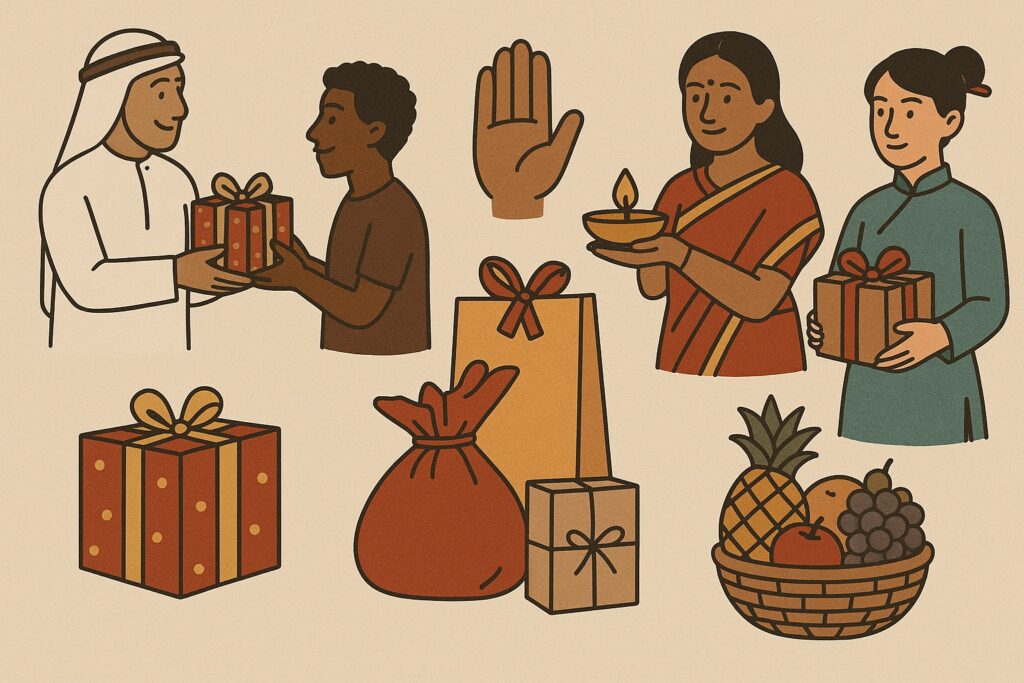
Gift-giving practices vary significantly across cultures and economic circumstances, requiring sensitivity and understanding when expressing this love language.
Cultural Variations:
Gift-Giving Traditions:
- Different cultures have varying approaches to appropriate gift-giving occasions, types, and expectations
- Some cultures emphasize practical gifts while others focus on symbolic or decorative items
- Understanding cultural context helps determine appropriate gift-giving practices
- Religious and cultural holidays may have specific gift-giving traditions and expectations
Reciprocity Expectations:
- Some cultures expect immediate reciprocation while others view gifts as freely given
- Understanding cultural norms around gift exchange helps navigate appropriate giving and receiving
- Different cultures may have varying comfort levels with accepting gifts from others
Economic Considerations:
Financial Sensitivity:
- Recognizing that people have different financial capabilities for gift-giving
- Focusing on thoughtfulness rather than expense to avoid creating financial pressure
- Understanding that meaningful gifts can be created or found regardless of budget constraints
- Being sensitive to economic disparities that might affect gift-giving ability
Class and Social Dynamics:
- Different socioeconomic backgrounds may have varying approaches to gift-giving
- Avoiding assumptions about what constitutes appropriate or meaningful gifts
- Respecting different priorities around spending money on gifts versus other necessities
- Understanding that gift preferences may be influenced by economic experiences and security
Navigating Cultural and Economic Differences:
- Communicate openly about gift-giving preferences and cultural expectations
- Focus on the universal desire to show care rather than specific gift-giving practices
- Adapt gift-giving approaches to respect cultural backgrounds and economic circumstances
- Emphasize creativity and thoughtfulness over conformity to any particular gift-giving standard
Teaching Others About Receiving Gifts
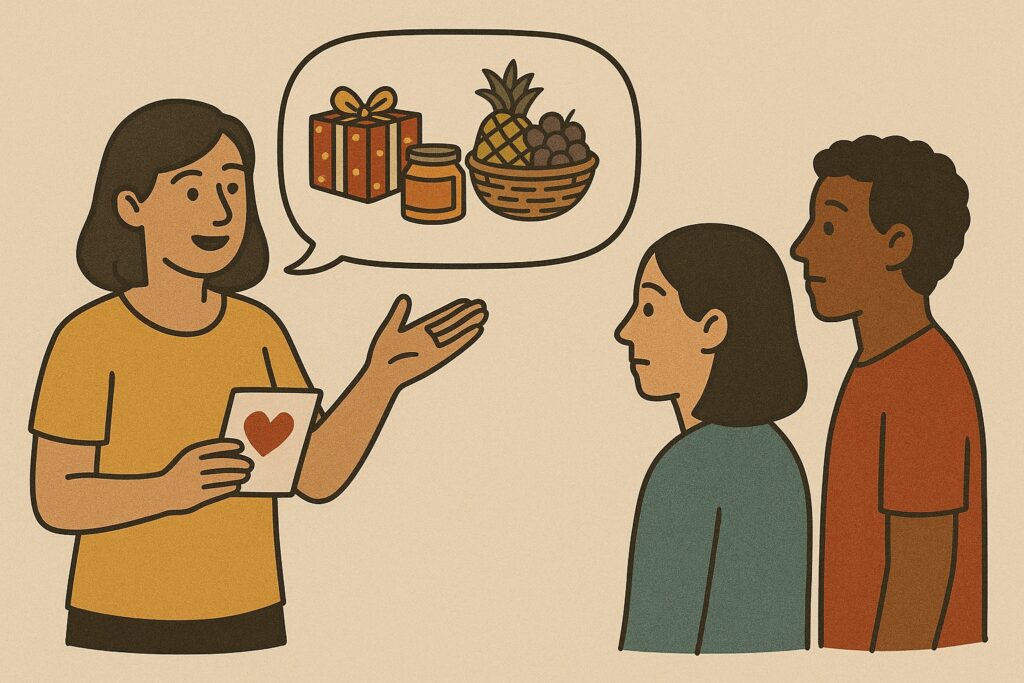
If Receiving Gifts is your love language, helping others understand what makes gifts meaningful to you can improve relationships and reduce misunderstandings.
Communicating Your Preferences:
Educational Approach:
- Explain that gifts represent thoughtfulness and care rather than material desire
- Share examples of meaningful gifts you’ve received and what made them special
- Help others understand that small, thoughtful gifts often mean more than expensive ones
- Clarify that it’s about feeling thought of and understood, not about accumulating possessions
Practical Guidance:
- Offer specific examples of gifts that would be meaningful to you
- Share information about your current interests, needs, or preferences
- Suggest appropriate price ranges or types of gifts to avoid creating pressure
- Provide guidance about timing—occasions when gifts would be especially appreciated
Avoiding Common Communication Pitfalls:
Don’t:
- Make demands or create ultimatums about gift-giving
- Compare your partner’s gift-giving to others’ or create competition
- Focus on what you haven’t received rather than appreciating what you have
- Make gift-giving feel like a test of love or commitment
Do:
- Express appreciation for thoughtful gifts, regardless of their cost or perfection
- Share why specific gifts were meaningful to help others understand your preferences
- Acknowledge the effort and thought behind gifts even when they miss the mark
- Offer to reciprocate or contribute to gift-giving in ways that work for your relationship
Building Gift-Giving Skills Progressively

If Receiving Gifts isn’t your natural love language but you want to connect better with someone who values it, developing these skills gradually will feel more authentic and sustainable.
Progressive Skill Development:
Week 1-2: Observation and Learning
- Pay attention to what the person mentions liking, needing, or wanting
- Notice what gifts they give to others as clues to their preferences
- Observe their reactions to gifts they receive from various people
- Start keeping a simple list of gift ideas when they occur to you
Week 3-4: Simple Gift Experiments
- Try giving one small, thoughtful gift based on something they mentioned
- Focus on inexpensive items that show you were listening and thinking of them
- Pay attention to their response and what aspects they seem to appreciate most
- Practice timing gifts for moments when they might need encouragement or support
Week 5-8: Expanding Gift Repertoire
- Experiment with different types of gifts—practical, fun, meaningful, creative
- Try both surprise gifts and gifts for specific occasions
- Practice putting thought into presentation and timing, not just selection
- Begin planning ahead for known gift-giving occasions
Week 9-12: Advanced Gift-Giving Skills
- Develop ability to choose gifts that reflect deep knowledge of their personality
- Learn to balance different types of gifts—practical, emotional, fun, supportive
- Practice giving gifts without expectation of specific responses or reciprocation
- Integrate thoughtful gift-giving naturally into your relationship patterns
Overcoming Development Barriers:
“I never know what to choose”: Start with safe, practical gifts related to their known interests, then gradually become more creative as you learn their preferences.
“I feel like it’s fake if I have to think about it”: Remember that intentional thoughtfulness often means more than spontaneous gestures. The effort you put into consideration shows care.
“I’m worried about spending too much money”: Focus on creativity and personal significance rather than cost. Many of the most treasured gifts are inexpensive or homemade.
“I don’t want to create expectations”: Give gifts freely and communicate that they’re expressions of care, not obligations. Consistent small gestures often work better than occasional elaborate ones.
The Long-Term Impact of Thoughtful Gift-Giving

When practiced consistently and appropriately over time, thoughtful gift-giving creates profound positive impacts on relationships and individual well-being.
Relationship Benefits:
Enhanced Understanding: Regular attention to someone’s preferences and needs through gift-giving develops deeper knowledge of who they are and what matters to them.
Increased Appreciation: Both giving and receiving meaningful gifts builds gratitude and recognition of the care and effort people invest in relationships.
Memory Creation: Thoughtful gifts create positive memories and provide tangible reminders of important moments and feelings in relationships.
Emotional Security: For people whose love language is Receiving Gifts, consistent thoughtful giving creates security and confidence in the relationship’s importance.
Individual Benefits:
Improved Observation Skills: Learning to give thoughtful gifts develops better attention to others’ needs, preferences, and emotional states.
Enhanced Creativity: Gift-giving encourages creative thinking and problem-solving as you find ways to show care within various constraints.
Greater Empathy: Focusing on what would be meaningful to someone else builds empathy and understanding of different perspectives and preferences.
Increased Generosity: Regular gift-giving often develops a more generous spirit and greater appreciation for the joy of giving to others.
Community and Family Benefits:
Stronger Traditions: Families and communities that embrace thoughtful gift-giving often develop richer traditions and stronger bonds.
Cultural Preservation: Gift-giving practices often carry cultural significance and help preserve traditions across generations.
Economic Support: Thoughtful local gift-giving can support small businesses and artisans in communities.
Social Connection: Communities where gift-giving is valued often have stronger social networks and better support systems for members.
Conclusion: The Language of Thoughtful Giving

Receiving Gifts as a love language represents one of humanity’s oldest and most universal expressions of care—the desire to give something of value to show that someone matters to us. When we understand that gifts are symbols of thought, care, and attention rather than expressions of materialism, we unlock a powerful tool for creating lasting emotional connection.
For people whose primary love language is Receiving Gifts, thoughtful presents aren’t about accumulating possessions—they’re about feeling seen, understood, and valued enough for someone to invest time and thought in selecting something meaningful. When we learn to give gifts that truly reflect knowledge and care, we create tangible reminders of love that can provide comfort and connection long after the moment of giving.
Whether you naturally express love through gift-giving or are learning to connect with someone who treasures thoughtful presents, remember that the most meaningful gifts come from attention, understanding, and genuine care rather than expense or obligation. The investment you make in learning to give thoughtfully will return to you in stronger relationships, deeper appreciation, and the profound satisfaction of bringing joy to people you care about.
Understanding Receiving Gifts as part of the complete love languages framework helps create relationships where everyone feels valued and understood. When we become fluent in the language of thoughtful giving, we contribute to building a world where care is expressed not just through grand gestures, but through the countless small ways we show others that they matter to us.
Ready to Discover Your Love Language Profile?
Understanding whether Receiving Gifts is your primary love language—or learning how to give more thoughtful and meaningful presents to others—begins with taking our comprehensive assessment. Discover your unique love language profile and get personalized guidance for building stronger, more connected relationships through all five love languages.
Take the Love Language Quiz Now
Want to explore specific challenges with giving or receiving gifts? Learn about navigating different gift-giving expectations in relationships, or discover creative ideas for meaningful presents that don’t require significant expense.


Leave a Reply